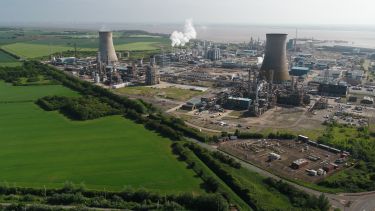Decarbonising a vital industrial area as part of the Zero Carbon Humber partnership

To transition to a more sustainable, decarbonised world, we need to focus closely on cleaning up the essential processes which keep our energy supply, infrastructure and supply chains running smoothly. This also includes vital industrial sectors like manufacturing, refining and power generation.
We’re working together with industry, academia and research centres to efficiently implement low-carbon processes in manufacturing in the UK’s industrial areas.
We need to support clean growth
Energy-intensive industries in historically industrial areas are vital to everyday life in the UK, but they produce a vast amount of carbon emissions. In Yorkshire, the Humber alone emits 12.4 million tonnes of CO2 a year, making it the most carbon intensive industrial cluster in the country. In order to make a cleaner industrial process a reality, all parts of the supply chain, from pipes to lorries to the power in each building, must decarbonise together.
The first net-zero industrial cluster
The Energy Institute and its research centres, including the Nuclear AMRC, are part of the £75 million Zero Carbon Humber (ZCH) project, which aims to accelerate decarbonisation in the UK’s most carbon-intensive industrial region. Developing carbon capture, utilisation and storage (CCUS) and hydrogen technology, and establishing shared regional infrastructure, transport and renewable energy generation, the ZCH project will use rapidly-developing technology and academic and industry expertise to drive the Humber towards becoming the UK’s first net-zero carbon industrial cluster.
H2H Saltend - the starting point
The initial focus of the ZCH Partnership is H2H Saltend, one of the world’s first full-scale low-carbon hydrogen production plants. The project will support the construction of a pipeline network connecting to industrial sites and gas and biomass power stations throughout the Humber, enabling them to capture their carbon dioxide emissions and switch to low-carbon hydrogen power. For this project, the University of Sheffield’s Nuclear AMRC will work alongside its sister centre to apply its expertise in developing the UK supply chain for the low-carbon energy sector.
The Nuclear AMRC can draw on its experience in developing the supply chain in other low-carbon sectors, including nuclear and offshore renewables, to identify the opportunities for UK manufacturers in industrial hydrogen production, storage, and distribution, as well as carbon capture, transportation, and storage.
Creating a greener future
The proposals of the ZCH project could reduce the UK’s annual emissions by 15 per cent, and in the process protect at least 55,000 existing jobs in the region, as well as creating new ones. Through the H2H Saltend project, blue hydrogen will be produced, and begin the underpinning of a new net-zero infrastructure for the UK. Our expertise in industry requirements, supply chain transformation and the technical aspects of hydrogen, CCS and energy generation will play a major part in decarbonising the Humber.
Supporting industrial decarbonisation
The expertise at use in this project - and which will be gained as a result of our involvement - means we can advise and deliver on large-scale industrial decarbonisation projects. At every stage of the decarbonising life-cycle, from inception to design to implementation, we have industry-focused skills and expertise to offer any industry partner.
To begin talking about partnership and project opportunities email the Energy Institute team at energyinstitute@sheffield.ac.uk
